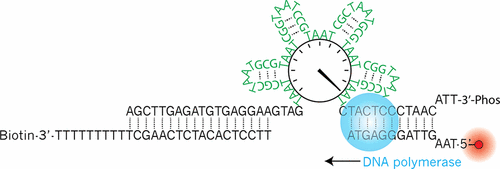当前位置:
X-MOL 学术
›
Nano Lett.
›
论文详情
Our official English website, www.x-mol.net, welcomes your
feedback! (Note: you will need to create a separate account there.)
Single-Molecule Clocks Controlled by Serial Chemical Reactions
Nano Letters ( IF 9.6 ) Pub Date : 2017-11-02 00:00:00 , DOI: 10.1021/acs.nanolett.7b04336 Alexander Johnson-Buck 1 , William M. Shih 1
Nano Letters ( IF 9.6 ) Pub Date : 2017-11-02 00:00:00 , DOI: 10.1021/acs.nanolett.7b04336 Alexander Johnson-Buck 1 , William M. Shih 1
Affiliation

|
Chemical clocks usually achieve well-defined temporal delays through concentration thresholding coupled to the production, degradation, activation, or inhibition of downstream effectors. In this way, the stochastic dynamics of many individual molecules yield essentially deterministic bulk behavior through ensemble averaging. As a result, their temporal evolution is governed by ensemble dynamics rather than by the behavior of an individual molecule or complex. Here, we present a general approach for the design of single-molecule clocks that permits quasi-deterministic control over the lifetime of single molecular interactions without any external synchronization. By coupling the dissociation of a bimolecular complex to a series of irreversible chemical steps, we interpose a well-defined time delay between binding and dissociation. The number and speed of irreversible steps can be varied to systematically tune both the lifetimes of complexes and the precision of the time delay, raising the prospect of localized timekeeping in nanoscale systems and devices.
中文翻译:

通过串行化学反应控制的单分子钟
化学钟通常通过与制造,降解,激活或抑制下游效应子相关的浓度阈值来获得明确定义的时间延迟。这样,许多分子的随机动力学通过集合平均产生本质上确定的本体行为。结果,它们的时间演变是由整体动力学决定的,而不是由单个分子或复合物的行为决定的。在这里,我们提出了一种设计单分子时钟的通用方法,该方法允许对单分子相互作用的寿命进行准确定性控制,而无需任何外部同步。通过将双分子复合物的解离耦合到一系列不可逆的化学步骤,我们在结合和解离之间插入了明确定义的时间延迟。
更新日期:2017-11-02
中文翻译:

通过串行化学反应控制的单分子钟
化学钟通常通过与制造,降解,激活或抑制下游效应子相关的浓度阈值来获得明确定义的时间延迟。这样,许多分子的随机动力学通过集合平均产生本质上确定的本体行为。结果,它们的时间演变是由整体动力学决定的,而不是由单个分子或复合物的行为决定的。在这里,我们提出了一种设计单分子时钟的通用方法,该方法允许对单分子相互作用的寿命进行准确定性控制,而无需任何外部同步。通过将双分子复合物的解离耦合到一系列不可逆的化学步骤,我们在结合和解离之间插入了明确定义的时间延迟。











































 京公网安备 11010802027423号
京公网安备 11010802027423号